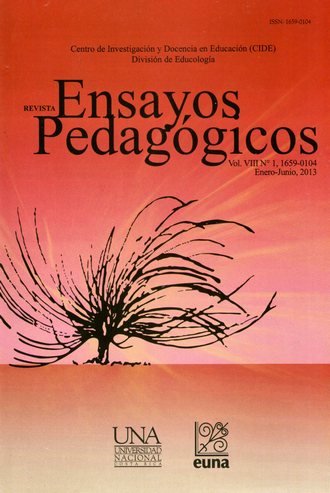Self-Regulation in the Written Composition Processes in First-Year College Students of the Major of Veterinay Assistance at Universidad Técnica Nacional, Atenas Campus
DOI:
https://doi.org/10.15359/rep.8-1.4Keywords:
self-regulation, strategic planning, epistemic writing, social mediation, cognitive context, selfsAbstract
First-year college students require an educational environment that will provide the foundation for their integral development. For this reason, classrooms should foster an environment of free communication and full development. These students are considered inexperienced or novice writers because they do not plan, do not set goals, do not take into account the audience, and do not have enough knowledge about strategies for essay writing in general. Thus, it would be ideal that in college, writers maximize their potential and transform not only their writing pattern but their knowledge in general starting from reflection and the discursive quality that they employ. All this can be accomplished with some self-regulation that would allow them to take over their text and make their writing autonomous since it originates from their particular perspective and according to their personal conceptions and socio-emotional ideology.
References
Bañales, G. (2010). Escritura académica en la universidad: regulación del proceso de composición, conocimientos del tema y calidad textual (Tesis doctoral). Barcelona.
Bañales, G. y Vega, N. (2010). Artículo: Aprender a escribir estratégicamente una alfabetización básica en la sociedad del conocimiento. Barcelona.
Barrantes, R. (1999). Investigación una camino al conocimiento, un enfoque cualitativo y cuantitativo. Costa Rica: Editorial UNED.
Flower, L. (1979). Writer-based prose: A cognitive basis for problems in writing. College English.
Flower, L. (1989). Studying Cognition in Context: Introduction to the Study. National Center for the Study of Writing, University of California at Berkeley y Carnegie Mellon University.
Hernández, R., Fernández, C., y Baptista, P. (2006). Metodología de la investigación. DF, México. Mc Graw Hill. Cuarta Edición
Hayes, R., & Flower, L. (1980). Identifying the organization of writing processes. En L. W. Gregg y E. R. Steinberg (Eds.), Cognitive Processes in writing (pp. 3-30). Mahwah, New Jersey: Lawrence Erlbaum Associates.
López, N. y Sandoval, I. (2005). Métodos y técnicas de investigación cuantitativa y cualitativa. Universidad Virtual, México.
McCutchen, D. (2011). From novice to expert: Implications of language skills and writing-relevant knowledge for memory during the development of writing skill. Recuperado de: http://jowr.org/articles/vol3_1/JoWR_2011_vol3_nr1_McCutchen.pdf
Monereo, C. y Badia, A. (2001). Ser estratégico y autónomo aprendiendo. Barcelona: Grao.
Monereo, C. Castelló, M. (1997). Estrategias de Aprendizaje. Madrid.
Monereo, C. Castelló, M. y otros (2001). Estrategias de enseñanza y aprendizaje. IX Edición. Barcelona: Grao.
Monereo, C. y Pozos, J. (2002). El aprendizaje estratégico. España. Editorial Santillana.
Monereo, C. (2007). Hacia un nuevo paradigma del aprendizaje estratégico: el papel de la mediación social, del self y de las emociones. España: EOS.
Downloads
Published
How to Cite
Issue
Section
License
Ensayos Pedagógicos is subscribed to the Attribution-NonCommertial-NoDerivatives 4.0 International Creative Commons Licence, which allows both authors and readers to freely download, store, copy, and distribute the final approved publisehd version of the manuscript (post-print) as long as this is done without commercial purposes, no derivative works are generated, and the source and author are mentioned. As well, Ensayos Pedagógicos declares that authors will remain the rightful owners of the copyrights of their work in perpetuity.







